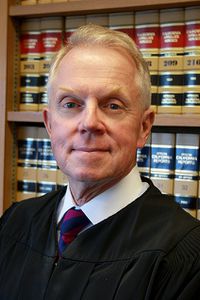Rolf Michael Treu
Rolf Michael Treu was a judge for the Superior Court of Los Angeles County in California. He was appointed to the court in 1995 by former governor Pete Wilson. Treu was most recently re-elected on March 3, 2020. He retired from the court on August 16, 2021.[1]
Education
Treu received his B.A. from the University of Redlands in 1970 and his J.D. from Loyola Marymount University in 1974. He was admitted to the bar in 1975.[2][3]
Career
Treu spent 20 years as an attorney prior to his appointment to the West Covina Municipal Court in 1995. He became the presiding judge of that court in 1999 and 2000. In 2001, he was transferred to the Los Angeles County Superior Court.[4]
Elections
2020
Incumbent Rolf Michael Treu was the only candidate to file and won the position by default when the election was canceled.
2014
See also: California judicial elections, 2014
Treu ran for re-election to the Los Angeles County Superior Court.
As an unopposed incumbent, he was automatically re-elected without appearing on the ballot.
[5]
Campaign themes
2020
Ballotpedia survey responses
See also: Ballotpedia's Candidate Connection
Rolf Michael Treu did not complete Ballotpedia's 2020 Candidate Connection survey.
Noteworthy cases
Judge gives failing grade to teacher tenure laws in California
California's job security laws for teachers got an "F" from Los Angeles Judge Rolf Treu, who ruled on June 10, 2014 that they were unconstitutional. The plaintiffs' attorney Theodore Boutros, Jr. proclaimed, following the ruling, "This decision is going to reverberate powerfully across California and across the nation."[6] Alex Caputo-Pearl, the president-elect of the Los Angeles teachers union, on the other hand, said, "This decision today is an attack on teachers, which is a socially acceptable way to attack children."[7]
The lawsuit was brought by an organization called Students Matter, on behalf of nine students. Boutros, who also successfully argued a lawsuit against California's same-sex marriage ban (Proposition 8), was a lead co-counsel for the plaintiffs. The lawsuit argued that current state laws made it too hard to fire ineffective teachers.
The judge agreed that the five laws in question gave too much protection to incompetent teachers, which was especially affecting poor and minority students. Thus, he explained they violated the right to education equality. Specifically, he ruled that the 18-month time frame, after which teachers could be granted tenure, was too short. He also pointed to the difficulties and high costs of firing teachers.
On the other side of the case, arguing in support of the laws, were the state of California, the California Teachers Association, and the California Federation of Teachers. They argued that job protections helped retain good teachers.
| “ | Let’s be clear: Teachers who are unable to carry out their crucial work should be ushered out of the profession. But the more important focus should be on recruiting, supporting and retaining great teachers for all our kids.[8] | ” |
| —Michael Powell, a spokesman for the American Federation of Teachers[7] | ||
Regarding the lasting ramifications of the case, William Koski, the director of the Youth and Education Law Project at Stanford University, stated:
| “ | What has happened here is the reformers have decided that change isn't happening fast enough through the Legislature, and this does provide a template for how to bring this type of litigation and maybe get the courts to join the conversation.[8] | ” |
| —William Koski[9] | ||
Glenn Rothner, one of the attorneys representing the unions, said, "We believe very strongly that we will prevail on appeal."[7]
See also
2020 Elections
External links
Footnotes
- ↑ courts.ca.gov, "JUDICIAL VACANCY ROSTER REPORT (8011)," accessed July 7, 2022
- ↑ Cite error: Invalid
<ref>tag; no text was provided for refs namedbio - ↑ Martindale, "Judge Profile: Rolf M. Treu," accessed June 11, 2014
- ↑ Pasadena Star-News, "Superior Court judge talks to Newton students in Hacienda Heights," June 9, 2011
- ↑ Los Angeles County Registrar-Recorder/County Clerk: Candidate list for 6/3/2014 primary election, accessed March 17, 2014
- ↑ San Jose Mercury News, "California laws on teacher tenure, layoffs and dismissal are struck down," June 10, 2014
- ↑ 7.0 7.1 7.2 Los Angeles Times, "Ruling on teacher job security is an attack on students, unions say," June 10, 2014
- ↑ 8.0 8.1 Note: This text is quoted verbatim from the original source. Any inconsistencies are attributable to the original source.
- ↑ Fox News, "Judge rules California teacher tenure laws unconstitutional," June 11, 2014
 |
State of California Sacramento (capital) |
|---|---|
| Elections |
What's on my ballot? | Elections in 2026 | How to vote | How to run for office | Ballot measures |
| Government |
Who represents me? | U.S. President | U.S. Congress | Federal courts | State executives | State legislature | State and local courts | Counties | Cities | School districts | Public policy |







